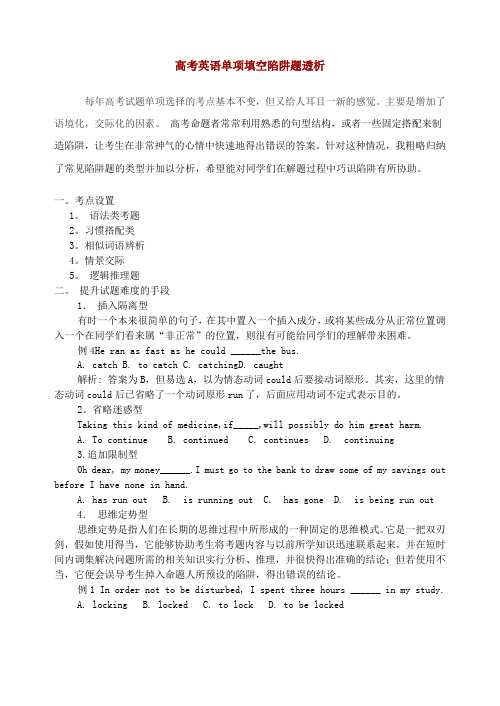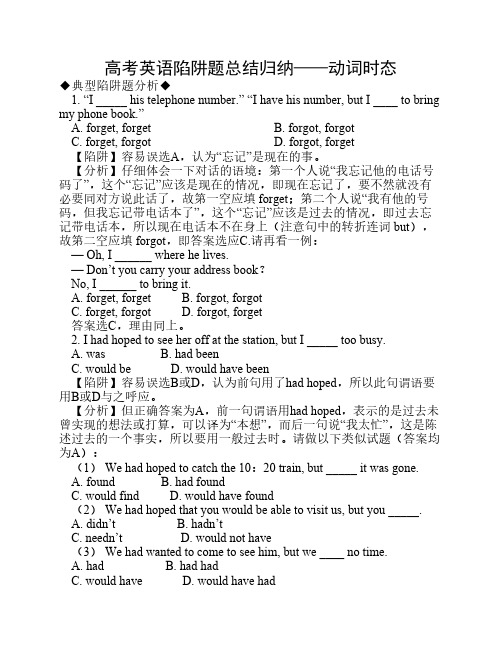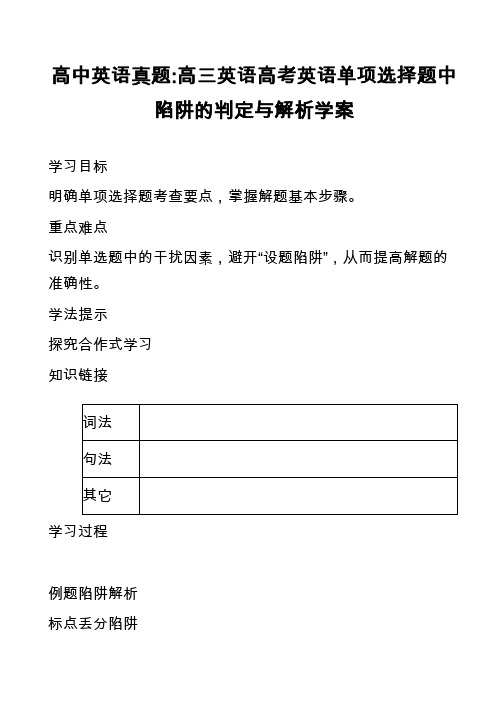高考英语单选陷阱题讲与练解析共62页文档
高考英语单选陷阱题讲与练[课件]
![高考英语单选陷阱题讲与练[课件]](https://img.taocdn.com/s3/m/3284620a79563c1ec5da7145.png)
【跳出陷阱】做题时,一定要仔细 观察题目,切忌凭定向思维去做题; 遇到似曾相识的题目,更要多留一 个心眼,多读几遍题干。切忌光看 答案就选。
●母语思维干扰
由于我们的母语是中文,大家潜意识里会 用中文的思维去思考英语中的问题,把中 国人的生活方式强加给外国人,而这一错 误却不是很容易能检查出来的,所以近两 年,这一类型的陷阱题深得命题人的喜欢。 2007高考英语陕西卷的 第12题以及2006年 江西卷的第22题,在设题上就采用了这种 干扰法。
单选陷阱题的类型
●定向思维干扰 ●母语思维干扰 ●标点符号干扰 ●插入信息干扰 ●语境情境干扰 ●变换句式干扰
●定向思维干扰
定向思维是指的人们在学习过程中形成的 一种固定的思维习惯和模式。高中三年, 大家都做了不计其数的练习题,特别是单 项选择题。所以,很多同学都形成了一些 思维定势。而命题人却恰恰抓住了这一点 设置了陷阱。而这类题型也是高考陷阱题 中最容易出现的一类。
Tips:
【跳出陷阱】平时复习时,多了解一 些中英文化差异。尽量避免用汉语思 维去解题。此外,还要记住一些单词 在中西文化中的含义有所不同,不可 通用。
●标点符号干扰
标点符号很不起眼,但在某些时候 却会直接影响你的答题,而我们都不 大重视这一环节,所以十分容易出错。 以前高考英语单选中曾利用问号做过 陷阱,现在的高考英语也有一些题目 与标点符号有关。
√
3. ---Haven’t seen you for ages! Do you still work in Guangzhou? ---_______. It’s two years since I worked there. A. Yes, I have B. Yes, I do C. No, I haven’t D. No, I don’t
高中英语单选题有解析典型“陷阱题”50例

----have fallen )落叶,又如:an escaped prisoner ( = a prisoner who has run out ofprison )一个逃犯;〔3〕表示状态,如:a broken window ( = a window that is broken )一扇破窗子,又如:lost in thought陷入沉思。
33. Let us not waste ______ time we have left .A. the littleB. littleC. a littleD. a little more答案是 A 项,一般地说,不定代词many , little或few前是不许使用定冠词的,但是如果它们修饰的名词有特指或限定意义时,它们前面就应使用定冠词了。
如:I soon finished thefew books she had lent me . (她借给我的那几本书,我很快就看完了。
)又如: We mustmake full use of the contradictions among the enemies , winning over the manyand opposing the few . (我们必须充分利用敌人的内部矛盾,争取多数,反对少数。
)34. I think the doctor is able to care of _____ is the matter with your son .A. allB. whatC. whateverD. anything答案是 C 项。
与前面第19 题的考察点whoever一样,whatever也具备两个意思,其一是no matter what ,引导让步状语从句;其二是anything that ,引导名词性从句,在此题中, Whatever引导的是一个宾语从句,whatever在这个宾语从句被用作主语。
高中英语课件高考英语陷阱题总汇(共869题,均附详解)

高考英语陷阱题总汇(共869题,均附详解)基础题,人人会做,显不出优势;高难题,人人不会做,拉不开距离;陷阱题,表面看起来很容易,所需知识也不一定很难,但其中隐含机关,预设陷阱,尽管你完全具备做好此类题的知识和能力,但由于你理解角度不对、分析思路不活、做题方法不当、使用技法不巧等,可能自认为捡了个大便宜,而实际上却刚好掉入了命题人为你精心准备的陷阱。
不信你就看看下面几道题:1. She was so angry and spoke so fast that none of us understood _______ he said meant.A. thatB. whatC. that thatD. what what仔细想想看,选A还是选B?请给出你的决定——未作决定之前请不要往后看!你的分析可能是这样的:选项C和D 不太可能是正确答案,因为像这样两个“引导词”叠用的情况一般不可能。
在A和B两个选项中,选项A肯定不行,因为它引导宾语从句时不能充当句子成分,所以只能选B了。
事实是:如果你选A,肯定错了;如果你选B,那也错了。
此题最佳答案是D,其中第一个what 用作动词meant 的宾语,第二个what 用作动词said 的宾语,即在none of us understood what what he said meant 中,none of us understood 为主句,what what he said meant 为宾语从句,而在此宾语从句中又包括有what he said 这样一个主语从句。
假若去掉句末的meant,则答案就是B了。
分析有道理吗?有点启发吗?你可要客观地评价噢!请再看一题:2. Everyone knows that _______ is dangerous to play with fire, but _______ is difficult is to prevent children from playing with fire.A. it, itB. what, whatC. it, whatD. what, it这次可要想好!请拿定主意,选C还是选D?未作决定之前请不要往后看!你的分析可能是这样的:此题既不选C,也不选D,而是选A。
高考英语陷阱题总结归纳—比较结构(附详解)

高考英语陷阱题总结归纳—比较结构(附详解)高考英语陷阱题总结归纳——比较结构◆典型陷阱题分析◆1. How beautifully she sings! I have never heard _____ voice.A. a betterB. a bestC. the betterD. the best【陷阱】容易误选D,认为最高级前要用定冠词。
【分析】其实此题最佳答案为A,该句可视为…I have never heard a better voice than her voice 之省略,全句句意为―她唱得多好啊!我从未听过她这么好的声音‖。
请再看以下类似的实例:He is fine, never better. 他很好,比以往任何时候都好。
This bird is really lovely. I‘ve never seen a finer one. 这只鸟真可爱,我从未见过这样好看的鸟。
比较以下试题,情形也大致相同:(1) ―I‘ve never found a better job.‖ ―_______.‖A. I don‘t think soB. Too badC. CongratulationsD. Do n‘t worry答案选C,I‘ve never found a better job可视为I‘ve never found a better job than this job 之省略,句意为:我从来没有找到比这份工作更好的工作,即这是我所找到的最好的工作。
(2) ―What do you think of the service here?‖ ―Oh, ______. We couldn‘t have found a better place.‖A. too badB. sorryC. wonderfulD. impossible答案选C。
We couldn‘t have found a better place 可视为We couldn‘t have found a better place than this place,其意为―我们不可能找到一个比这个地方更好的地方‖,即―这是我们所能找到的最好的地方‖。
高考英语单项填空陷阱题透析

高考英语单项填空陷阱题透析每年高考试题单项选择的考点基本不变,但又给人耳目一新的感觉。
主要是增加了语境化,交际化的因素。
高考命题者常常利用熟悉的句型结构,或者一些固定搭配来制造陷阱,让考生在非常神气的心情中快速地得出错误的答案。
针对这种情况,我粗略归纳了常见陷阱题的类型并加以分析,希望能对同学们在解题过程中巧识陷阱有所协助。
一。
考点设置1。
语法类考题2。
习惯搭配类3。
相似词语辨析4。
情景交际5。
逻辑推理题二。
提升试题难度的手段1.插入隔离型有时一个本来很简单的句子,在其中置入一个插入成分,或将某些成分从正常位置调入一个在同学们看来属“非正常”的位置,则很有可能给同学们的理解带来困难。
例4He ran as fast as he could ______the bus.A. catchB. to catchC. catchingD. caught解析: 答案为B,但易选A,以为情态动词could后要接动词原形。
其实,这里的情态动词could后已省略了一个动词原形run了,后面应用动词不定式表示目的。
2。
省略迷惑型Taking this kind of medicine,if_____,will possibly do him great harm.A. To continueB. continuedC. continuesD. continuing3.追加限制型Oh dear, my money______.I must go to the bank to draw some of my savings out before I have none in hand.A. has run outB. is running outC. has goneD. is being run out4.思维定势型思维定势是指人们在长期的思维过程中所形成的一种固定的思维模式。
它是一把双刃剑,假如使用得当,它能够协助考生将考题内容与以前所学知识迅速联系起来,并在短时间内调集解决问题所需的相关知识实行分析、推理,并很快得出准确的结论;但若使用不当,它便会误导考生掉入命题人所预设的陷阱,得出错误的结论。
高考英语陷阱题总结归纳——动词时态(附详解)

高考英语陷阱题总结归纳——动词时态◆典型陷阱题分析◆1. “I _____ his telephone number.” “I have his number, but I ____ to bring my phone book.”A. forget, forgetB. forgot, forgotC. forget, forgotD. forgot, forget【陷阱】容易误选A,认为“忘记”是现在的事。
【分析】仔细体会一下对话的语境:第一个人说“我忘记他的电话号码了”,这个“忘记”应该是现在的情况,即现在忘记了,要不然就没有必要同对方说此话了,故第一空应填 forget;第二个人说“我有他的号码,但我忘记带电话本了”,这个“忘记”应该是过去的情况,即过去忘记带电话本,所以现在电话本不在身上(注意句中的转折连词 but),故第二空应填 forgot,即答案选应C.请再看一例:— Oh, I ______ where he lives.— Don’t you carry your address book?No, I ______ to bring it.A. forget, forgetB. forgot, forgotC. forget, forgotD. forgot, forget答案选C,理由同上。
2. I had hoped to see her off at the station, but I _____ too busy.A. wasB. had beenC. would beD. would have been【陷阱】容易误选B或D,认为前句用了had hoped,所以此句谓语要用B或D与之呼应。
【分析】但正确答案为A,前一句谓语用had hoped,表示的是过去未曾实现的想法或打算,可以译为“本想”,而后一句说“我太忙”,这是陈述过去的一个事实,所以要用一般过去时。
请做以下类似试题(答案均为A):(1) We had hoped to catch the 10:20 train, but _____ it was gone.A. foundB. had foundC. would findD. would have found(2) We had hoped that you would be able to visit us, but you _____.A. didn’tB. hadn’tC. needn’tD. would not have(3) We had wanted to come to see him, but we ____ no time.A. hadB. had hadC. would haveD. would have had(4) I had expected to come over to see you last night, but someone______ and I couldn’t get away.A. calledB. had calledC. would callD. would have called(5) The traffic accident wouldn’t have happened yesterday, but the driver _______ really careless.A. wasB. isC. wereD. had been3. Dear me! Just _____ at the time! I _____ no idea it was so late.A. look, haveB. looking, hadC. look, hadD. looking, have【陷阱】此题容易误选D,认为第一空用现在分词表伴随,第二空填have 的一般现在时,以保持与前面时态的一致性。
高考英语单项选择填空八大陷阱透析课件

A. is to
B. to be
C. to are D. to going to be
3.母语干扰型 .
学外语最忌母语干扰,但由于 母语在大脑中根深蒂固,所以 常常会对外语学习者大脑中尚 不牢固的外语知识产生负面影 响。命题者也往往利用这一点, 制造陷阱。
陷阱一
I’ll come to see you if______.
A. to prevent, to live B. to prevent, from living C. to preventing, to live D. to preventing, living
陷阱二
The “Two Cities” referred _____ London and Paris.
2. The letter I have been looking
forward to ______ at last.
A. come B coming C. has come D . Came 思维定式
பைடு நூலகம்
3. Remind him ______ the window when
he leaves.
A. of closing B. closing
not ______their books during
examinations.
A. read
B. watch
C. notice
D. look at
思维定势是指人们在长期的思维 过程中所形成的一种固定的思维 模式。如果运用得当,会使我们 很快得出正确的结论;但若运用 不当,它便会误导考生掉入命题 人所预设的陷阱,得出错误的结 论。
A. you’re convenient B. it is convenient for you C. you feel convenient D. it is convenient with you
高中英语真题-高三英语高考英语单项选择题中陷阱的判定与解析学案

高中英语真题:高三英语高考英语单项选择题中陷阱的判定与解析学案学习目标明确单项选择题考查要点,掌握解题基本步骤。
重点难点识别单选题中的干扰因素,避开“设题陷阱”,从而提高解题的准确性。
学法提示探究合作式学习知识链接学习过程例题陷阱解析标点丢分陷阱She left and on the table is her message: ______ I’ve gone sh opping now and will be back at 10:30.A thatB whereC whichD /This morning he bought a novel.______ was written by Dicken s.A ItB whichC asD that常识丢分陷阱Tom is ______ to climb the tree. In my opinion he’s yellow!A happyB cleverC braveD afraid-Bread ______ butter?-Bread ______ no butter, thank you.A or,andB and, butC or, butD and, and词性丢分陷阱(1)- What do you think of the film we saw last night?-I feel ______ that the film is well worth seeing once again.A strongB stronglyC hardlyD hard(2)Don’t ______; no one will hurt you.A afraidB frightenC fearD nervous母语丢分陷阱Don’t read _____ the sun. It’s bad for your eyes.A inB underC withD by“ I don’t feel like going out this evening.”“ Me _____.”A tooB neitherC sameD not插入语丢分陷阱Mike, as far as I know, ______ like to play music.A doB feelC feelsD doesHe hasn’t come yet. What do you consider______ to him?A happensB has happenedC happeningD to happen思维定势丢分陷阱There ______ a meeting this afternoon.A will haveB hasC is going to beD isI’ll do everything I _____ you.A can helpB can to helpC can helpingD help巩固练习______ some of the juice—perhaps you will like it.A TryingB TryC ToD Having triedShe got there very late; _____ felt very sorry.A andB so sheC sheD therefore-Can I help you, sir?-_______.A Yes, you can help meB No, I don’t need any help.C Of course, if you likeD No, thanks, I’m being servedWhat he said sounds______.A nicelyB pleasantlyC friendlyD reasonably_____ he is weak, he is always working deep into the night. A In spite of B Besides C Apart from D ThoughI can’t find the file I need because they’re all _____.A out of sightB out of reachC out of orderD out of placeDon’t worry. You _____ get the book you want this Friday,___ __, according to the record, Mr Clark is to come to return it. A will; after B may; after C must; when D shall; whenKnowing ______ , as a matter of fact, one shouldn’t know is a terrible thing.A whichB thatC whatD whenPlease tell me the way you thought of ______ the garden.A take care ofB to take care ofC taking care ofD how to t ake care of_____ at the back door if nobody hears you at the front door.A Try to knockB Try knockingC Trying to knockD Tryi ng knocking高考链接(1) If you __ go, at least wait until the storm is over.A. canB. mayC. mustD. will(2) What are you doing out of bed, Tom? You're____ to be asleep.A. supposedB. knownC. thoughtD. considered(3) Twenty students want to attend the class that aims to teach to read first.A. whatB. whoC. howD. why(4) You are old enough to your own living.A. winB. gainC. takeD. earn(5) No matter how , it is not necessarily lifeless.A. a desert may be dryB. dry a desert may beC. may a desert be dryD. dry may a desert be(6) The exam results will be on Friday afternoon.A. put downB. put offC. put upD. put away(7)- Would you like tea or coffee?- , thank you. I've just had some water.A. EitherB. BothC. AnyD. Neither(8) I'll go to the library as soon as I finish what IA. was doingB. am doingC. have doneD. had been doi ng(9)He had no sooner finished his speech the students star ted cheering.A. sinceB. asC. whenD. than(10) around the fire, the tourists danced with the local peo ple.A. GatherB. To gatherC. GatheringD. To be gathering(11) Bring the flowers into a warm room they'll soon open.A. orB. andC. butD. for(12) When the news came the war broke out, he decided, to serve in the army.A. sinceB. whichC. thatD. because(13) a strange plant! I've never seen it before.A. WhichB. WhatC. HowD. Whether(14) By the time Jack returned home from , his son. from c ollege.A. graduatedB. has graduatedC. had beenD. had gradua ted(15) - I probably shouldn't have any more cake.-Oh, . It won't kill you.A. go aheadB.hold on, pleaseC. you're welcomeD. that'll do六、小结高三英语高考英语单项选择题中陷阱的判定与解析学案学习目标明确单项选择题考查要点,掌握解题基本步骤。
